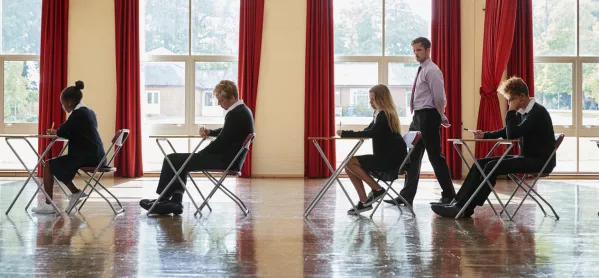- Home
- Coronavirus GCSEs: ‘Near impossible’ for boards to cope
Coronavirus GCSEs: ‘Near impossible’ for boards to cope

The exams system will find it “near impossible” to cope with the vast number of students applying for special consideration for their GCSE and A-level grades if exams are disrupted during the coronavirus outbreak, a former exam board chief is warning.
The ex-chief executive of one of England’s big three school exam boards told Tes that while they already have measures in place for individual pupils to apply for consideration, this would be extremely difficult with such a large group of pupils potentially affected.
Related: Coronavirus is making us rethink school exams? Good
Coronavirus: ‘Teachers asked to set extra exams’
Background: Exam appeals ‘tilted in favour of private schools’
And they warned that the crisis would make it difficult for exam boards and Ofqual to use their usual approach to standardising GCSE and A-level results, which could mean that grades were “slightly higher” this year.
Tes understands that exam boards are currently discussing the use of special consideration to adjust pupils’ grades with the government.
The former exam board head expects candidates to apply for special consideration if they are unwell for one of their papers or if their school closed because of the coronavirus. However, they warn, the sheer number of pupils likely to be affected by the virus will leave boards struggling to cope.
“The best scenario is if they [pupils] sit one paper to give a measure of their performance, as exam boards already have systems in place for that, but that’s by exception rather than the whole cohort,” they said.
“You’d have to have special consideration for the whole cohort. You can imagine the long list people will put forward for special consideration, and the question is, can the system cope with a student-by-student application?
“That’s 600,000 students doing GCSEs in one form or another, and with an average sitting eight GCSEs - so that’s already 4.8 million qualifications, with 3 or 4 papers per subject. For the system to cope doing this by exception is near impossible.”
They said that if pupils were able to sit one paper the boards would use statistical modelling to give special consideration and work out what their grade should be.
This would be based on key stage 2 data combined with teachers’ predicted grades for the GCSEs, and based on prior GCSE attainment in the case of A levels.
However, the former exam board chief noted this could be seen as unfair, especially for GCSE candidates, as “you’re predetermining someone’s performance on their marks at 11”.
In the event that large groups of pupils could not sit any exams at all, they said boards were likely to use teachers’ predicted grades, with national pupil data from key stage 2 and GCSE used to assess the accuracy of individual schools’ predictions.
They said this could mean exam grades are “slightly better” this year than for previous cohorts, as teachers’ predicted grades were “notoriously optimistic”.
The former exam board head added that it would be difficult to use typical methods to standardise the proportion of pupils gaining each grade, as it is “really hard to standardise using a predicted grade from a teacher rather than a mark”.
This could result in GCSE and A-level grades being “slightly better” than in previous years.
Education secretary Gavin Williamson said: “I know your pupils will be worried about what all this means for their upcoming exams.
“This is only to be expected, especially when so much hard work has gone into them.
“I see first hand the enormous amount of work and effort that goes into exams by children and their teachers. I want to reassure you that we are doing everything to make sure that this year’s exams are fair for students, and that their efforts will be fairly rewarded.
“My department is in regular discussions with Ofqual, ASCL, schools and other unions, and we will continue to work together on these issues. We will ensure students, parents and teachers are kept up to date.”
Exams regulator Ofqual, said: “We continue to work closely with exam boards, other regulators and the Department for Education to plan for a range of scenarios.
“In all cases, our overriding priority will be ensuring fairness to students.”
The Joint Council for Qualifications - which represents exam boards - was contacted for comment.
Keep reading for just £1 per month
You've reached your limit of free articles this month. Subscribe for £1 per month for three months and get:
- Unlimited access to all Tes magazine content
- Exclusive subscriber-only stories
- Award-winning email newsletters



